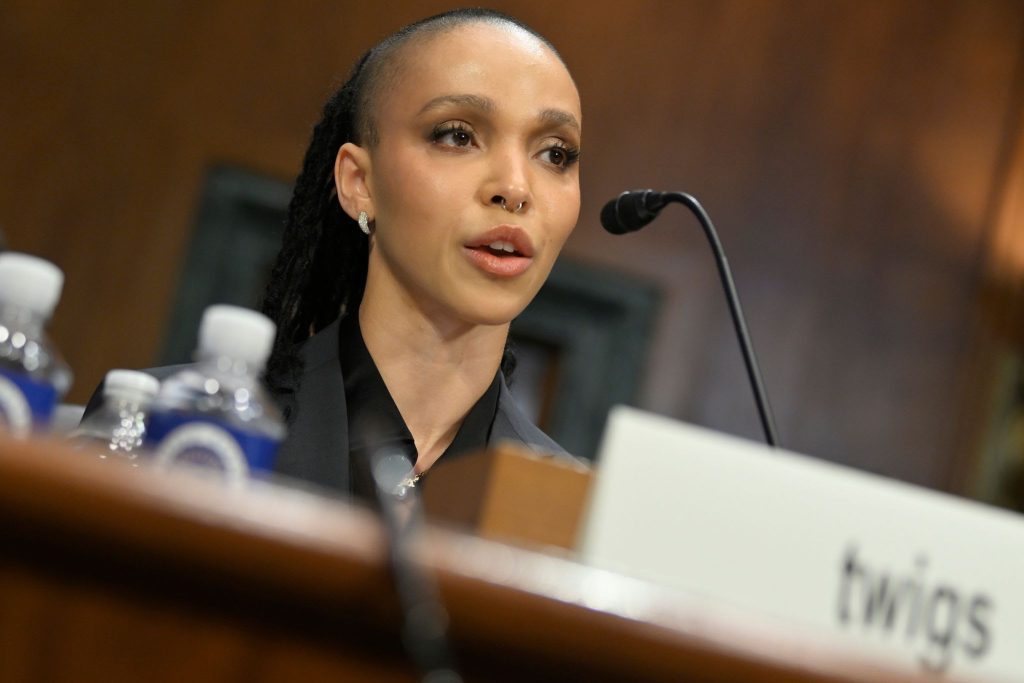Singer, songwriter, producer, dancer & actor Tahliah Debrett Barnett (“FKA twigs”) and Warner Music Group CEO Robert Kyncl shared powerful testimony during a Senate Judiciary Subcommittee on Intellectual Property hearing earlier today in the nation’s capital about the importance of guardrails to protect an individual’s voice and likeness as well as the responsibility of tech platforms as artificial intelligence (AI) rapidly evolves.

The discussion focused on the bipartisan Nurture Originals, Foster Art, and Keep Entertainment Safe (NO FAKES) Act – a proposal introduced by Senators Chris Coons, Marsha Blackburn, Amy Klobuchar, and Thom Tillis that would offer federal protections against the use of non-consensual digital replications in audiovisual works or sound recordings for all Americans.
Multi-hyphenate talent, FKA twigs throughout acknowledged the importance of consent from the individual whose being is the very essence of this technology.
“The fact that somebody could take my voice, change lyrics, change messaging or work with an artist that I didn’t, it really leaves me very vulnerable.
If legislation isn’t put in place to protect artists, not only will we let artists who really care about what we do – that have spent a long time developing themselves – but it would also mean that fans wouldn’t be able to trust people that they’ve spent so many years investing in.”
In response to claims that deepfakes of living or deceased people are needed for filmmaking, FKA twigs explained, “I think the problem is, if you’re able to use an artist’s voice and likeness without consent about their life story, you’re giving the impression that it’s the equivalent of an autobiography, rather a biography … and that’s a confusion.
If you’re able to use my voice and my exact face, [then] a team of writers in Hollywood that want to over dramatize things and make it more tragic or fantastical, that’s what makes me really nervous, uncomfortable and vulnerable.
If it’s an actor, we know to take it with a pinch of salt. If it is the person themself, then it just feels too clear and not fair.”
Informed by his past experience as a top executive at YouTube and Netflix, Kyncl spoke from deep knowledge and respect for both technology and creators and called for clear guardrails for AI.
“Through AI, it is very easy for someone to impersonate me and cause all manner of havoc. They could speak to an artist in a way that could destroy our relationship or say untrue things that would damage our business.”
Kyncl summed up, “the truth is, everyone is vulnerable.”
In a watershed moment, in response to questioning from Senator Mazie Hirono, all witnesses present including those calling for changes or limits to the proposed legislation agreed that Congress should enact new protections for individuals’ voices and images.
Addressing free expression concerns, SAG-AFTRA National Executive Director & Chief Negotiator Duncan Crabtree-Ireland added, ”I am concerned that we are only looking at one side of the First Amendment consideration here.
The other side is the right that each of us has to our own freedom of speech to be able to communicate our ideas, to associate ourselves with ideas that we want to so and not be associated with ideas we disagree with – that is being really trampled on by this unfettered ability of people without a federal right.”
Senator Tillis said, “I’m glad that we’re taking up this bill. I do feel strongly we should do everything we can to try and move it in this Congress.”
RIAA Chairman & CEO Mitch Glazier applauded the Committee’s thoughtful review of the NO FAKES Act discussion draft. “Today’s hearing sets the table for swift and strong action by Congress to protect every American from unconsented deepfakes and voice clones.
Compelling, personal testimony from both FKA twigs, Warner CEO Robert Kyncl, and SAG-AFTRA National Director & Chief Negotiator Duncan Crabtree-Ireland made an overwhelming case for new legislation protecting creators’ livelihoods and legacy and giving us all the power to stop bad actors from using our voices and images to generate abusive deepfakes.”
At today’s hearing, Chairman Coons announced plans to finalize and formally introduce the NO FAKES Act this summer. Alongside the House No AI FRAUD Act, both chambers are now moving forward with national measures to protect individuals’ voice and likeness rights.
Kyncl’s op-ed published today in The Hill, titled Four Rules To Make Artificial Intelligence Work For Humans further laid out the importance of Consent, Monetization, Attribution and Provenance as AI is developed.
He expressed, “These proposals would establish clear ground rules, helping to prevent a world where AI can appropriate a person’s identity without their permission. This would also have a ‘halo effect,’ helping to curb misinformation, identity theft, and hate-fueled content.”





